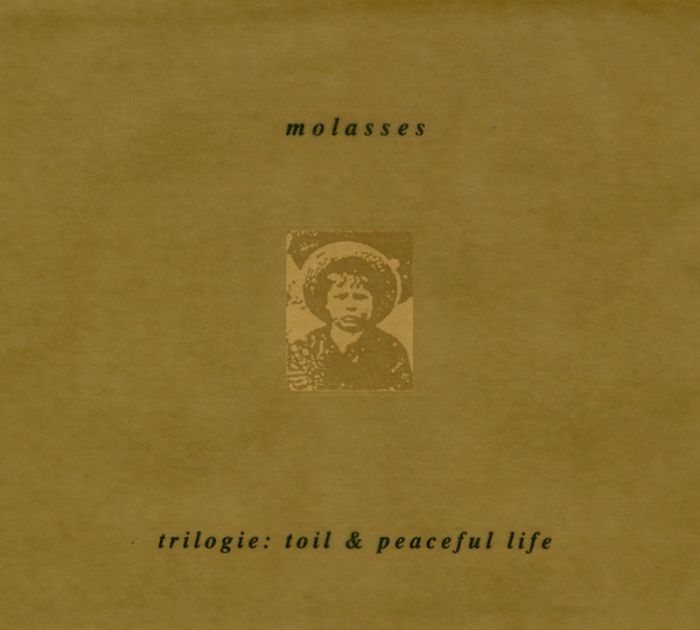Trilogie: Toil & Peaceful Life by Molasses (Review)

You’re walking down the street when you pass a man slumped over in the gutter. His eyes are glazed over, his few remaining teeth are worn and yellow against blackened lips, and his hands and face are covered in sweat, grime, and blood. You quickly avert your eyes lest he sees your look of disgust and attempt to walk by without being noticed. You’re still trying to put the smell out of your mind when you hear him. At first, you assume he’s just drunk and rambling on about nothing. And then you listen closer.
Yes, he’s rambling, but these aren’t the words of a drunk caught in the grip of the bottle. His words are slurred but you can still make out stories of his childhood, of wandering the country, of things he has seen, sins he has committed, and dreams that he still thinks might come true even now, in his dying hour. Perhaps he’s mad, done in by one too many drinks and one too many nights out on the road. But he’s seen things you’ll never see, he’s experienced things you’ll never know, and the sorry condition he’s in makes the beauty in his stories all that more poignant.
Molasses’ music plays out like the last ramblings of that old drunk, with the emphasis, sometimes, on “ramblings.” It’s easy to picture Scott Chernoff (Molasses’ singer and songwriter) hunched over his battered guitar, his eyes shut tight from last night’s hangover, his voice straining to sing each word as loaded with meaning as possible. To say that Chernoff’s vocals and lyrics are an acquired taste is an understatement. They’re probably the primary obstacle most people would have to overcome in order to like any of Molasses’ music. Heck, they grate on me quite a bit at times. Just imagine a drunken combination of Bob Dylan, Will Oldham, and David Tibet. (I have a feeling that some of you just shuddered at the thought.) But it’s hard not to get caught up in the images and fevered visions of his lyrics. Like Sixteen Horsepower’s David Eugene Edwards, Chernoff’s concerned with sin and redemption, holiness and righteousness. But whereas Sixteen Horsepower approaches those themes with the conviction of a revival preacher, Chernoff approaches them with the desperation of a dying sinner.
“Saint Catherine (Idiot’s Waltz)” sets the stage, as Chernoff sings of being “born on the burnt earth, afraid and recoiling” and “down in the mire, kicking against history.” “Lisa’s Waltz” opens with the shrieks and squeaks of the incoming subway, and soon gives way to another haunting piece, this one about Chernoff’s emigration from California to Canada. Chernoff sings of the sights he has seen, the people he has met, and closes with this confession; “I’ve abandoned my family for all of these fugitives/I give my father to his sins/Well, it’s here in the rabble you find your true kin.” One gets the feeling that his emigration was far from just a simple trip, but rather more like some sort of journey across a barren, hollow wasteland.
The album reaches its apex, musically and thematically, with a harrowing rendition of “Amazing Grace.” Originally written by a former slaveship captain turned pastor, the song is a powerful reminder of Divine forgiveness. As with all of the songs on the CD, it unfolds slowly, beginning with Chernoff’s voice and acoustic guitar. Slowly, strings and percussion fill in the unoccupied spaces and Chernoff is joined by two others on vocals. It all builds with the intensity and speed of a fever dream, hazy and untouchable, but strangely haunting in its delirium. When the song finally comes to a close, the quivering electronics and sickly strings fading into the distance, it’s tempting to listen to it once more, just to make sure that what you heard was real.